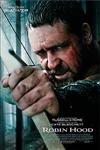- REVIEW
- READER REVIEWS
Robin Hood
|
(No longer in theaters)
|
|
Genre
Action/Adventure, Drama
Producer
Brian Grazer, Ridley Scott, Russell Crowe
Distributor
Universal
Release Date
May 14, 2010
Release Notes
Nationwide
Official Website
Review
Ridley Scott’s Robin Hood is a pompous, interminable hash. Billed as a precursor to the legend we know, it’s rich in bogus historical context, along with enough mud, blood, and clutter to overwhelm our happy memories of Errol Flynn’s grin and Olivia de Havilland’s radiance. Here, Robin and Marian are played by a scowling Russell Crowe and a grim Cate Blanchett, who has the face of a wooden squaw stained by decades of cigar smoke. I can’t remember a more un-fun-looking couple.
Scott, convinced he has much to say about oppression and social justice, presents a Robin who returns from the Crusades with post-traumatic-stress disorder after helping to slaughter tens of thousands of guiltless Muslims and goes on to write the Magna Carta. In between, he travels to Nottingham and informs Marian of her husband’s death. Amid all the gritty, mucky, barnyard realism, Blanchett receives the bad news with a mask of stoicism, turns away from Crowe, totters, puts a fluttery hand to her heart, and promptly regains her composure. It’s Blanche DuBois Goes Medieval. Crowe follows this spectacle by taking a bath, which allows the newly single Blanchett to behold him in his jiggly splendor. While the aging stars grit their teeth and pretend to be sweet on each other, a bald French spy affecting an English accent pushes King John to tax his subjects so ruthlessly that the French will be able to cruise across the Channel and plate escargot by suppertime.
In a Ridley Scott film, war is hell�on the eyes and ears. He jams together disparate whackings and hackings and uses a flickery, quasi-slow-motion as if he thinks it will smooth out the gaps in continuity. If his aim is to deglamorize battle, he misses the most vital component of humanism: to present the dead as individuals instead of anonymous founts of CGI gore. As in Gladiator, it all comes down to righteous vengeance. Robin leads the Saxons against the French pig-dogs who skewered Max von Sydow as Marian’s blind father-in-law�a cause we embrace because Von Sydow alone among the hams seems to be having a good time.
The first printed verse to refer to the figure of Robin Hood (who probably existed) is this, from the thirteenth or fourteenth century: �Lithe and Lysten, gentylmen / That be of frebore blode I shall tell of a good yeman / His name was Robyn Hode / Robyn was a proude outlawe / Whyles he walked on grounde / So curteyse an outlawe as he was one / Was never none found.� Read it out loud. It has the swing, the panache, of the Flynn�Michael Curtiz production of The Adventures of Robin Hood in all its goofy Technicolor romanticism.
Here’s an example of Ridley Scott’s modern, revisionist sensibility: Waiting for the Frenchies to land, Robin throws open the visor of a suspiciously effeminate soldier: �For the love of God, Marian!� Undeterred, Marian flings herself on the bald Frenchman who murdered Von Sydow and then (just like a girl!) tumbles into the surf and requires rescue. This allows Crowe to emit the slow-motion cry of rage: �NooooOOOOOOHHHHH!� Before the bad guy can finish off Marian, he charges, knocks the blackguard over, appears to get caught between two boats (it’s hard to follow the action), then sees his foe fleeing on horseback: �NooooOOOOOOHHHHH!� A moment later he carries the stunned Marian up the beach in his arms, neglecting to remove her layers of armor and chain mail beforehand. It’s fun to think of what happened after that: the pain in Crowe’s groin, his realization that he has just given himself an inguinal hernia, and his cry when Scott yells �Cut�: �NooooOOOOOOHHHHH!�
Related Stories
New York Magazine Reviews
- David Edelstein's Full Review (5/24/10)
